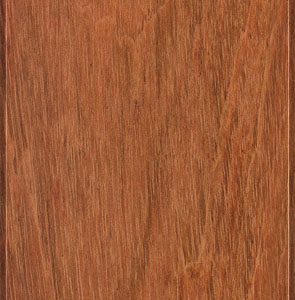Jatoba’
( Hymenaea courbaril )
Average Dried Weight: 57 lbs/ft 3 (910 kg/m 3 )
Specific Gravity (Basic, 12% MC): .77, .91
Janka Hardness: 2,690 lb f (11,950 N)
Modulus of Rupture: 22,510 lb f /in 2 (155.2 MPa)
Elastic Modulus: 2,745,000 lb f /in 2 (18.93 GPa)
Crushing Strength: 11,780 lb f /in 2 (81.2 MPa)
Shrinkage: Radial: 4.2%, Tangential: 8.0%, Volumetric: 12.1%, T/R
Ratio: 1.9
Color/Appearance: Heartwood varies from a light orangish brown to a
darker reddish brown, sometimes with contrasting darker grayish brown
streaks. Color tends darken upon exposure to light. Sapwood is a light
grayish yellow, clearly demarcated from the heartwood.
Grain/Texture: Grain is typically interlocked, with a medium to coarse
texture. Good natural luster.
Endgrain: Diffuse-porous; large pores, very few; solitary and radial
multiples of 2-3; mineral deposits (dark brown) occasionally present;
parenchyma vasicentric, aliform (lozenge or winged), confluent,
and marginal; narrow to medium rays, normal spacing.
Rot Resistance: Jatoba is rated as being very durable in regards to rot
resistance, and is also resistant to termites and most other insects.
(Though it has been reported to be susceptible to attack from marine
borers.)
Workability: Jatoba is considered difficult to work with on account of
its density and hardness, and has a moderate blunting effect on tool
cutters. Jatoba also tends to be difficult to plane without tearout due to its
interlocking grain. However, Jatoba glues, stains, turns, and finishes
well. Responds well to steam-bending.
Common Uses: Flooring, furniture, cabinetry, tool handles,
shipbuilding, railroad ties, turned objects, and other small specialty items.
Useful info’s : Although it’s widely named “Brazilian Cherry,” (mostly
among flooring sellers), it bears little relation to the domestic Cherry
( Prunus serotina ) that is found in the US, except perhaps that its natural
color closely matches the common stained color of domestic Cherry that
has been aged/stained reddish-brown as seen on some interior furniture.
Jatoba is exceptionally stiff, strong, and hard—representing a great value
for woodworkers seeking high-strength, low-cost lumber.

